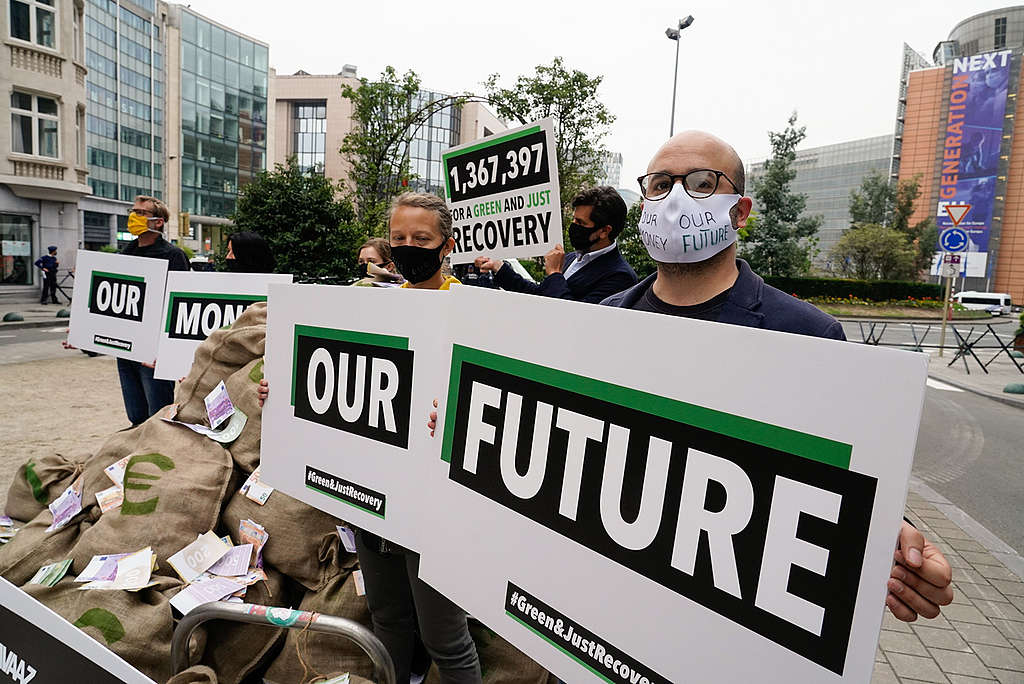EU recovery money should fund green economy, not polluters
Brussels – Civil society representatives called on European leaders meeting in Brussels today to use taxpayers’ money to fund a just and green recovery, not polluters. In a meeting on the eve of the European Council, representatives of Avaaz, Greenpeace and Transport & Environment (on behalf of the Green10) handed over a petition signed by over 1,300,000 Europeans [1] to Rudy Volders, Chief of the Integrated Europe team of European Council President Charles Michel.
European leaders are meeting to decide on a coronavirus recovery package – the EU alone will make €1.85 trillion available through the EU’s budget and recovery fund [2]. These funds must not line the pockets of polluting industries, like aviation, which have already sought an unprecedented €34.4 billion in government bailouts since the beginning of the Covid-19 crisis, without binding environmental conditions [3].
To warn against the real risk that the money will sustain the business practices of polluting industries, European citizens held banners reading “Our money – our future” and “1,367,397 for a green and just recovery” in multiple languages, against a backdrop of several bags of cash to symbolise the €1.85 trillion that are on the table.

The organisations members of the Green10, plus Avaaz, Sum of Us and WeMove also sent a letter [4] to EU ministers and heads of state and government, outlining what activities the recovery package should not support, and what a green recovery should look like.
Greenpeace EU climate policy adviser Sebastian Mang said: “European leaders should use public money to fund a green and just future for all, not to keep polluting industries on life support. The last remaining forests are going up in smoke, the polar caps are melting at an alarming speed, and millions are demanding action – obsolete and polluting economic activities, like aviation, fossil fuels, factory farming, have no place in Europe’s investments for the future. Governments have a duty to agree clear rules and conditions for how our money will support Europe’s green regeneration, while investing in green jobs, renewable energy, public transport and ecological farming.”
Pascal Vollenweider, Avaaz Campaign Director says: “Corona is the ultimate trial by fire for EU leaders. Today they must take sides, and decide whether to spend trillions to kickstart the green growth transition we desperately need, or prop up the polluters locking us into the dirty old economy. It’s our money, and 1.3 million Europeans want to see it invested into a clean, safe future.”
Transport & Environment director of sustainable finance Luca Bonaccorsi said: ”There’s been a lot of lip service to the green recovery, but the EU Recovery Plan fails to provide even the most basic environmental safeguards. Fossil fuels, combustion engine vehicles, road building… European money can basically be used for anything in the Commission proposal. This is the moment of truth: enough talk, we need a clear green spending target and a list of things EU money cannot be used for”.
The International Energy Agency, as well as leading economists, are among those to have called for a post-Covid-19 “green recovery” that “builds back better”, by cutting CO2 emissions, while boosting the economy. According to Agora Energiewende, only €80 billion of the €1.85 trillion are blocked off for climate protection, while €2.4 trillion are needed before 2027 to meet the EU’s 2030 climate target.
Notes:
[1] Petition sites: Avaaz, Sum of Us, WeMove.
[2] The €1.85 trillion is made up of €1.1 trillion from the overall EU budget, the so-called Multiannual Financial Framework (MFF), plus €750 billion in new money, which the European Commission proposes to spend to address the economic crisis sparked by the Covid-19 pandemic. The largest fund in the recovery package (the Recovery and Resilience Facility, worth €560 billion) does not include basic environmental safeguards, such as a list to exclude environmentally harming activities (Art.16).
[3] By 26 June 2020, European airlines – such as Air France, KLM, Lufthansa, EasyJet, Scandinavian Airlines – had already been granted financial support amounting to €29.9 billion, with €4.5 billion under discussion for other airlines. The EU has failed to introduce any binding climate condition to the bailout, and the conditions set by national governments are not binding enough and are not in line with the Paris Agreement goals.
[4] The letter highlights a “polluters list” of who should be banned from receiving EU recovery funds. The group of signatories claims European Commission president Ursula von der Leyen’s proposed Recovery and Resilience Facility (€560 billion) lacks sufficient green safeguards to ensure the spending does not hinder the EU from meeting its climate and other environmental targets.
The organisations have listed 21 activities which must not get EU recovery funds, including: the fossil fuel industry; airport and motorway expansion; fossil fuel cars and trucks; diesel and gas-powered ships; the textiles industry (unless sustainable and ethical); factory farming; live animal testing (except if it meets strict EU criteria); logging.
ends
Contacts:
Greenpeace EU
Sebastian Mang – Greenpeace EU climate policy adviser: +32 (0)479 601289, sebastian.mang@greenpeace.org
Greenpeace EU press desk: +32 (0)2 274 1911, pressdesk.eu@greenpeace.org
Avaaz
Pascal Vollenweider, Avaaz Campaign Director: +41 79 334 94 57, pascal@avaaz.org
Transport & Environment
Luca Bonaccorsi, Director of Sustainable Finance and Digital Engagement: +44 7930 135653
Nico Muzi, Senior Director of Communications & Campaigns: +32 (0)484 278791



